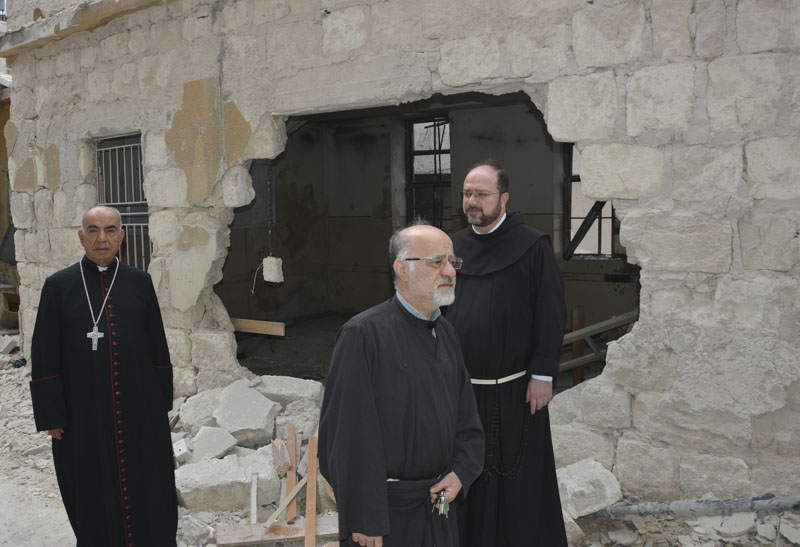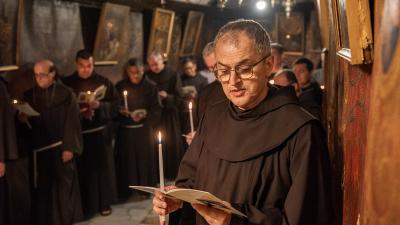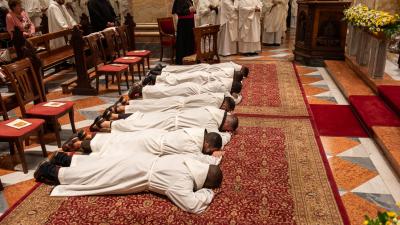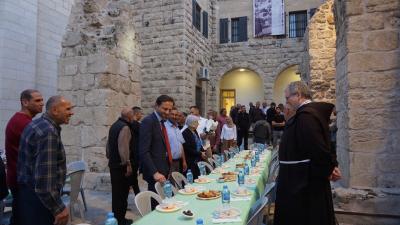
“I spend most of my time in Aleppo and I want to stay here.” This is how Mons. Georges Abou Khazen spoke about his ministry as the Catholic bishop of Aleppo and the apostolic vicar of the Latins in Syria: as a shepherd along with his suffering herd.
On what occasions did you meet the Minister General and the Custos of the Holy Land on his visit to Syria?
We saw each other at mass in the Parish of Aleppo and then in another monastery we had a lunch together. After mass, Father General handed us a tile from St. Peter's Door in Rome. It had been closed in 2000 but was then opened last year for the Jubilee of Mercy. It represented a very strong sign for us: solidarity with us and the symbol that we are part of the great family of the Catholic Church. Bringing a tile to Aleppo today where there is so much destruction also means to symbolically bring the hope of reconstruction. And we hope that reconstruction will come our way.
What did people say about their visit?
They were guests at the Franciscan parish and they visited the Franciscan friars there. They celebrated mass and spoke to the people, who were very impressed, moved and enthusiastic. Being visited by these personalities brings encouragement and gives hope. For the people it means you can think about returning to normalcy.
For you, who have been living in Syria for years, what would you want people to know about today's situation? What is not talked about enough
The truth is not talked about enough. We would like people to understand what is going on and why it is happening. The way in which most media have talked about the whole Syrian crisis is not true. For example, I am referring to foreign intervention in Syria. Why did it happen? Like the American bombing. Everyone talked about it, but they did not talk about the victims: 400 civilian casualties and two villages were completely destroyed. Is not it a crime to bomb infrastructure and bridges? Nobody talks about this. The Americans have disabled our entire electrical system, and they bombed the dam that now has a serious risk of being severely damaged. And how many people will die if this happens? What fault do the poor people have in all of this?
What does it mean for you to be bishop, shepherd, of a people who are suffering, like the Syrian people?
For me it is always painful to see people suffer, to see people who do not have anything. For example, in Aleppo, for more than a year, we have been without electricity. We also went for a few months without water. There is no mention of the sanctions, the embargo against Syria, at the expense of civilians. We cannot import medicines, machinery for hospitals, gasoline, diesel. And suffers because of this? Of course not the big guys. The people. But in such difficult times we feel even more united to the faithful and the people who are close to us. As a shepherd, I hope I can always be close to my flock.
When faced with poverty and suffering, how do you encourage people to believe that Jesus has not abandoned them?
We try to insist on hope as a virtue. Christians have not always had an easy time. Here many are children or grandchildren of martyrs, and this strengthens their faith and Christian identity. In Damascus in 1880, for example, more than eighty Christians were massacred. Some still have the photo of their grandfather or great grandfather posted on the door or the walls of their home. “He died for the faith,” they say, and they also attach themselves more to this faith.
Many Christians have left Syria, but some have remained. What can you do for them?
Half the population of Syria are refugees. Perhaps some Christians will return in the future. Today, thanks to the help of our benefactors, we first try to help people survive. We are helping to repair some homes.
We are also thinking of helping to create some small businesses, so that the Syrians can work to support themselves. You can only think about coming back if you have a home or a job.
What do you hope for Syria today?
That the violence may stop, and that this river of blood may end, that peace and reconciliation may come.
Can you give us an example of a story of how life is in Syria during these times?
We had a couple who waited eight years before having a son. Their 12-year-old son died from the shrapnel of the civilian bombings in Aleppo. He was their only son. In their immense sorrow, they made a great act of faith: they decided to remain in Aleppo. They prayed, “May the Lord give us the strength to witnesses to the faith, may our son be like a sacrifice to God that prevents the death of other children of his peers.”
Beatrice Guarrera
for the Holy Land




